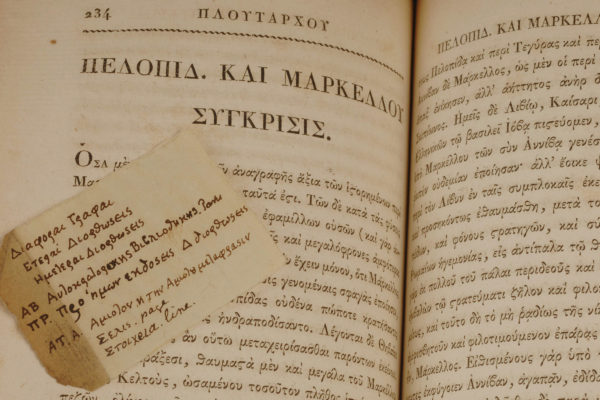74 of Thomas Jefferson’s books identified at Washington University library
The Thomas Jefferson Foundation and Washington University in St. Louis announced the discovery by Monticello scholars that a collection of books, long held in the libraries at WUSTL, originally were part of Thomas Jefferson’s personal library.
Neureuther competition seeks book-collecting entrants
Students who have a passion for collecting books can compete for prizes of $1,000 or $500 by entering the 24th annual Neureuther Student Book Collection Essay Competition. Sponsored by Washington University Libraries, the Neureuther competition offers prizes to four students who write short essays about their personal book collections.
Rafael Moneo to speak Feb. 28
Rafael Moneo is arguably the most celebrated Spanish architect working today, known for innovative modern buildings that deftly navigate even the most challenging urban sites while preserving and respecting the existing environments. At 6:30 p.m. Monday, Feb. 28, Moneo will discuss his work for the Sam Fox School of Design & Visual Arts’ spring Public Lecture Series.
Trichinosis parasite gets DNA decoded
Scientists have decoded the DNA of the parasitic worm that causes trichinosis, a disease linked to eating raw or undercooked pork or carnivorous wild game animals, such as bear and walrus.
Epidural electrocorticography may finally allow enduring control of a prosthetic or paralyzed arm by thought alone
Daniel Moran, PhD, associate professor of biomedical engineering and neurobiology in the School of Engineering & Applied Science at Washington University in St. Louis, is developing brain-computer interfaces based on grids of electrodes that lie beneath the skull but outside the dura mater, the protective membrane that covers the brain. His next project is to slip a thin 32-electrode grid he designed with a colleague under a macaque’s skill and to train the monkey to control — strictly by thinking about it — a computational model of a macaque arm.
Shrinking labs’ carbon footprint focus of sustainability competition
Proposals ranging from sharing electricity savings with lab users to allowing students to bid on how much electricity they can save are among the ideas that students suggested in the Olin Sustainability Case Competition. The winner gets $5,000 cash and a meeting to present her proposal to the chancellor and other top administrators.
Pioneering gamer to speak for Assembly Series
Pioneering game developer Ernest Adams, who had a hand in developing the Madden NFL Football line and Dungeon Keeper, will be on the campus of Washington University in St. Louis for an Assembly Series presentation at 6 p.m. Thursday, Feb. 24, in Steinberg Hall Auditorium. The event is free and open to the public.
George Washington Week to celebrate campus’ namesake
The annual George Washington Week, sponsored by the sophomore honorary Lock & Chain, kicks off on President’s Day, Monday, Feb. 21. The week will have many opportunities to celebrate Washington University’s namesake, including presentations, horse and buggy rides, dancing and volunteer opportunities.
Notables
Li-Wei Chang, PhD, research instructor in pathology and immunology, has received a two-year, $180,000 career transition award from the National Library of Science for research titled “Novel Bioinformatics Tools for Gene Regulatory Network Inference.” … Matthew Erlin, PhD, associate professor of German in Arts & Sciences, has received a one-year, $50,400 Fellowship for University Teachers […]
News highlights for February 18, 2011
Inside Higher Ed Yanked from the margins 02/18/2011 A new blue-ribbon commission has been assembled in a bid to put the humanities and social sciences on an equal footing on the public agenda with science, technology, engineering and mathematics. Gerald Early, professor of modern letters at Washington University in St. Louis, is among 41 cultural […]
View More Stories

